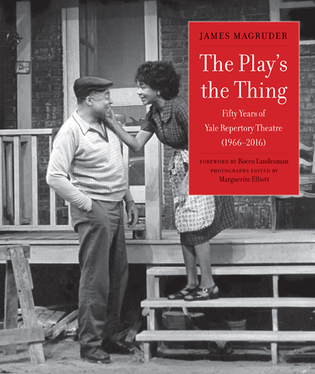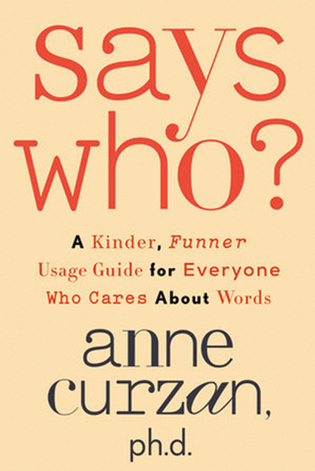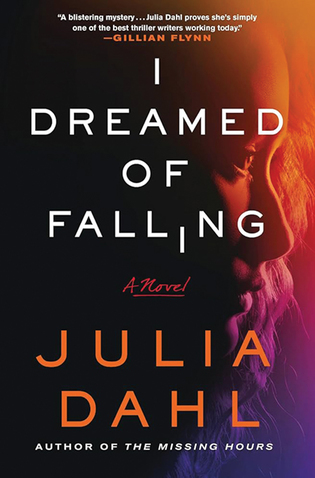
The Play’s the Thing
James Magruder ’84MA, ’92DFA
Yale University Press, $60
Reviewed by Mark Blankenship ’05MFA
Right there in his preface to The Play’s the Thing, James Magruder ’92DFA acknowledges that by writing about the first half century of the Yale Repertory Theatre, he’s bound to “disgruntle” readers who would’ve preferred he cover a different batch of productions, a different group of actors, or a different set of opinions on why the Rep has been central to the American theater from the day it was founded. “Where I trained my gaze was informed by my education and my taste,” he says, but as it happens, his education and his taste are what make the book so much fun.
Case in point: any old Wikipedia page could explain that playwright Sarah Ruhl’s rise to prominence was aided by her six Yale Rep productions. Magruder vivifies this fact by interviewing people who made those shows happen, including a stage manager, an actor, and Ruhl herself. Then he adds a superb paragraph that contextualizes her playwriting within America’s metaphysical stage tradition. Both his writing and his thinking are so crisp that you might want to put the book down for a moment just to marvel at this insight tucked in the middle of page 240.
That’s how it goes on every page: Magruder (who was my professor for two semesters at what used to be called the Yale School of Drama) spends a few paragraphs on a straightforward timeline of events, then veers off into, say, a juicy anecdote about Athol Fugard and August Wilson mentoring students at a bar. But as colorful as they are, these stories aren’t mere digressions: they’re reminders that what happens at this particular theater ripples through the larger culture.
To that end, The Play’s the Thing deserves a wide readership. Yes, it will appeal to those who worked or trained at the Rep, especially since the index at the back makes it easy to discover which colleagues and classmates merited inclusion.
However, the book does more than chronicle this single institution. It uses the Rep as a lens for examining the entire American theater’s development from 1966 to 2016. That ought to snag anyone who cares about how we make plays in this country.
Mark Blankenship ’05MFA is the bureau chief of The Food Section: Nashville.
__________________________________________________________________

Funner Usage Guide for Everyone Who Cares About Words
Anne Curzan ’91
Crown, $29
Reviewed by Ben Yagoda ’75
If the third word in the subtitle of Anne Curzan’s new book caught you short, it was no accident. Some years back, the psychologist Steven Pinker was quoted as remarking that a surefire way to tell if someone was born after 1967 or so was if they accepted “fun” as a full-fledged adjective. The internet tells me that Curzan was born in 1969, but that’s not the main reason she’s okay with “funner.”
She asks readers to consider sentences like “We went to a fun party” and “That party was really fun,” and imagines most of us, even the 60-plus crowd, would consider them perfectly fine, even though “fun” is used as an adjective rather than a noun. Why, then, do sticklers object to “funner”? The problem, she suggests, isn’t grammar but predisposition and habit, and these won’t last: “My prediction is that funnest will be acceptable in more and more contexts first, and then funner will scoot in on its coattails.”
In Says Who?, Curzan, a professor of English and linguistics at the University of Michigan, addresses a few dozen other potentially or allegedly problematic words and usages, including “impact” as an verb and “impactful” as an adjective; whether something can be “more unique” than something else; “data” as a singular noun; and “they” as a singular pronoun. (See the second sentence of this review.)
Her discussions are always interesting, enlightening, and based on a wide body of knowledge and research. I literally wore out a pencil underlining her good points and writing exclamation points in the margin. (Yes, she has a chapter on using “literally” to mean “figuratively.” Spoiler alert: it’s kosher.)
In disputes over proper language, the warring parties have commonly been dubbed the prescriptivists (and sometimes, alarmingly, the grammar Nazis) and, for the supposedly anything-goes scholarly types, the descriptivists. Curzan proposes alternatives: grammandos and wordies. The bellicosity of the former term and the playfulness of the latter suggest where her allegiances lie, and the grammandos among her readers will probably want to pick a fight with her every few pages.
And that’s just part of what makes Says Who? a very fun book.
Ben Yagoda ’75 is author of the recently published Gobsmacked!: The British Invasion of American English. His podcast is The Lives They’re Living.
__________________________________________________________________

I Dreamed of Falling
Julia Dahl ’99
Macmillan, $29
Reviewed by Sylvia Brownrigg ’86
Julia Dahl’s vivid page-turner is set in the Hudson Valley and combines deft, sympathetic descriptions of a close-knit community with a compelling weave of corrupt city officials, greedy developers, and the deepening mystery over a young woman’s dead body.
When yoga instructor Ashley, young mother of four-year-old Mason, is found face down by the river the day after a friend’s house party, it is all too easy for the police, and even her friends, to assume her death was accidental, and drug-related. Fentanyl has made its mark in Adamsville, but so have older forms of partying involving alcohol and weed. Such goings-on are not always viewed with favor by the COVID wave of recently arrived Brooklyn and Manhattanites, who set themselves apart from the locals; Dahl scatters sharp observations on these cultural differences throughout.
It is Roman, Mason’s father and Ashley’s long-term partner, who emerges as the protagonist. He uncovers the many secrets Ashley was keeping from him, becoming sure she was murdered. Roman’s work as the main reporter for the local newspaper has sharpened his investigative skills and given him familiarity with the town’s diverse residents.
As gripping as Dahl’s crime story is, the heart of the book remains Ashley’s bereaved family, three generations living in one sometimes awkward but affectionate household: Roman’s mother Tara, who has been Mason’s primary caregiver; her contractor boyfriend John; and depressed, grieving Roman. Though Roman and the reader press on to learn what really happened to Ashley, the reporter’s other journey may be the more emotionally satisfying: his resolution to be a better father to his son, as the best way to honor the boy’s late, beloved mother.
Sylvia Brownrigg ’86 is author, most recently, of The Whole Staggering Mystery.
 loading
loading

